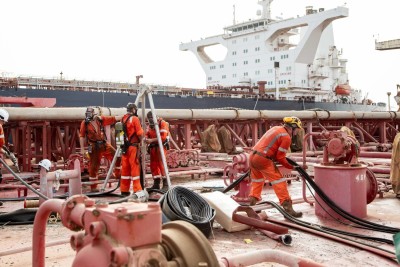The United States praises the completion of the transfer of oil from "Safer"


The United States praised the process of completing the transfer of more than one million barrels of crude oil from the dilapidated tanker “Safer” to the alternative tanker, which spared Yemen and the region a major environmental disaster.
Jack Sullivan, the US National Security Adviser, thanked David Gresley, the United Nations Resident Coordinator for Humanitarian Affairs in Yemen, and the United Nations Development Program (UNDP) for their "leadership and successful implementation of this complex operation."
On Friday, Dr. Ahmed bin Mubarak, the Yemeni Minister of Foreign Affairs, announced the completion of the process of unloading crude oil from the dilapidated tanker “Safer” to the alternative tanker, as part of the rescue plan sponsored by the “United Nations.” To avoid the largest environmental disaster in the world.
Sullivan added, in a statement: “Today, the United Nations completed the unloading of more than one million barrels of crude oil from the Safer tanker, which is an old giant tanker anchored off the Yemeni coast in the Red Sea. To avoid an oil spill that would have caused significant environmental, economic and humanitarian damage, ”noting that the United States mobilized, last year, under the leadership of its special envoy to Yemen, Tim Lenderking, an international coalition to finance the process.
He pointed out that the Safer ship served as a floating offshore terminal for Yemeni oil exports until 2014, when the Yemeni conflict halted exports and maintenance of the tanker, adding, “Years of neglect exposed the ship to imminent danger of spillage, which would damage the entire Red Sea region and beyond.” ». Sullivan urged donors to mobilize the additional funds needed to complete the final steps of the United Nations plan to address all remaining environmental threats.
According to the Secretary-General of the United Nations, Antonio Guterres, despite the importance of the step of transferring oil from one ship to another, “this does not mean that the journey is over,” noting that “the next critical step is to arrange for the delivery of a specialized buoy to which the replacement ship will be attached.” safely and securely.”
The United Nations says it has collected about $121 million from 23 countries, the European Union, the private sector and the public through crowdfunding, and the organization's Office for the Coordination of Humanitarian Affairs has provided funding for this process, but about $20 million is still needed. .
The fate of crude oil remains ambiguous, while the United Nations continues to negotiate with the Yemeni government and the Houthis. In order to come up with a solution to sell it.